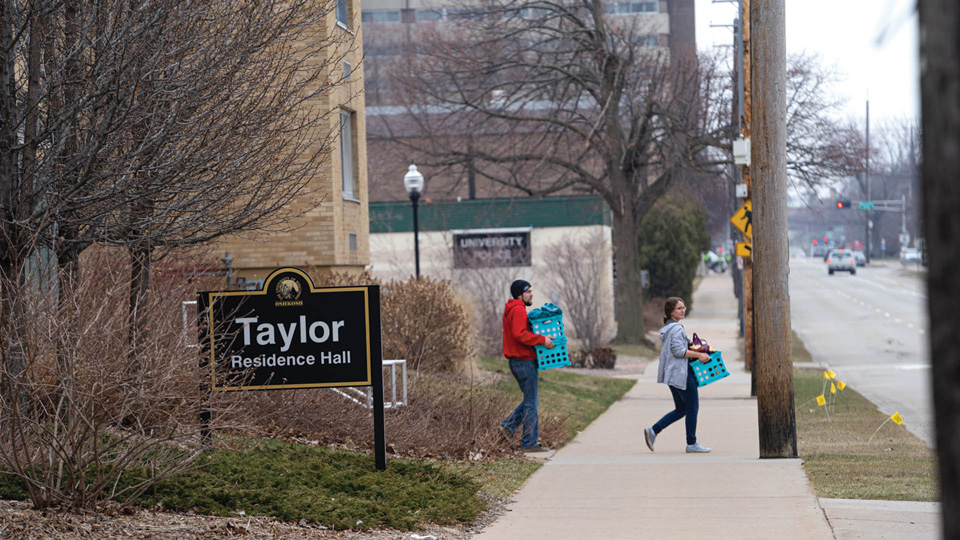The 2020 spring semester at the University of Wisconsin Oshkosh was anything but ordinary.
From the first Student Health Center advisory in January to the initial impact on students studying abroad and the monumental shift to online classes at the end of March, the COVID-19 pandemic challenged our campus community.
“Based on the absolute unprecedented nature of the worldwide response to COVID-19, it is clearly a moment of historic significance,” said UW Oshkosh Archivist Joshua Ranger in April.
As the weeks turned into months and the novel coronavirus continued to spread around the world, UW Oshkosh students, faculty, staff and alumni found unique ways to learn, work and engage.
Here are six examples that chronicle how the campus community pivoted amid the pandemic.
1. Until further notice
Spring break started early for students when UWO suspended classes at the Fond du Lac, Fox Cities and Oshkosh campuses, beginning the week of March 16. Students moved out of residence halls as faculty quickly prepped for courses to resume through alternative delivery methods March 30.
At the time, Chancellor Andrew Leavitt said, “COVID-19 drives us to take action that, ideally, would have been crafted and vetted over a period of years, certainly not two weeks. We understand this has meant rapid, difficult and thoughtful work on the part of our faculty and instructional academic staff – and all of the related support services.”
2. Tutors to the rescue
College of Education and Human Services professor Marguerite Penick-Parks connected UW Oshkosh to a St. Norbert College initiative that paired teacher candidates with hundreds of K-12 students across the U.S. to provide grade-appropriate, online tutoring.
Parents turned teachers appreciated the break while tomorrow’s teachers learned to adapt in an uncertain time. “It gives students the practice they need to become qualified to student-teach,” Penick-Parks said.
 3. Healthcare heroes
3. Healthcare heroes
UWO nursing students, faculty and alumni joined healthcare workers around the country in dealing with an influx of patients due to the coronavirus. Among them was Paahoua Xiong, a 2015 nursing grad who balanced her time as a student in UWO’s Doctor of Nursing Practice-Family Nurse Practitioner program and as a staff nurse in the ER at Froedtert Hospital in Milwaukee.
Xiong was struck by how her coworkers pulled together. “The camaraderie during this pandemic is phenomenal. We look out for each other and in a sense, we have become a big family that has each other’s backs,” she said.
4. Survey says
UWO researchers immediately started analyzing the impact of the pandemic as well as policies governing life amid the global crisis. The University’s Center for Customized Research and Services (CCRS) began a monthly survey of the economic impact on Wisconsin businesses. Results in April pointed to financial losses in the millions and months of recovery lasting into 2021.
“The cumulative impact of the survey results in April and May tell the story of businesses first responding to the emergency of the immediate impacts and then reassessing their new, long-term reality,” said Jeffrey Sachse, CCRS interim director.
5. Tassels turned
The University’s 146th spring commencement was marked with a first-ever virtual ceremony on Saturday, May 16. The online event honored the academic achievements of about 1,670 graduates earning associate, bachelor’s and graduate degrees with formal remarks, student speeches and digital slides of each graduate.
“While the current pandemic has disrupted the normal course of our semester, it cannot change what our students have accomplished. Finishing their studies under these circumstances gives even more reason to celebrate,” Provost John Koker said.
6. Forging a way forward
Long before the spring semester came to a virtual close, admissions and enrollment management professionals at UWO were turning the tables on student recruitment for the fall 2020 semester and beyond. With campus tours canceled, admissions counselors turned to a host of tools to communicate with high school seniors as they deliberate their choices.
“We want prospective students, and their families, to know we are here to help you through the application and admission process,” said Paul Gedlinske, admissions director. “We may not be able to meet face-to-face, but we are willing and available to help through email, text, chat, video calls and phone calls.”
Laurie Stevens, associate admissions director, said the pandemic has challenged the status quo.
“It has forced everyone on campus to be more creative and flexible, which are important for organizational success and will continue to be called upon moving forward,” she said.

